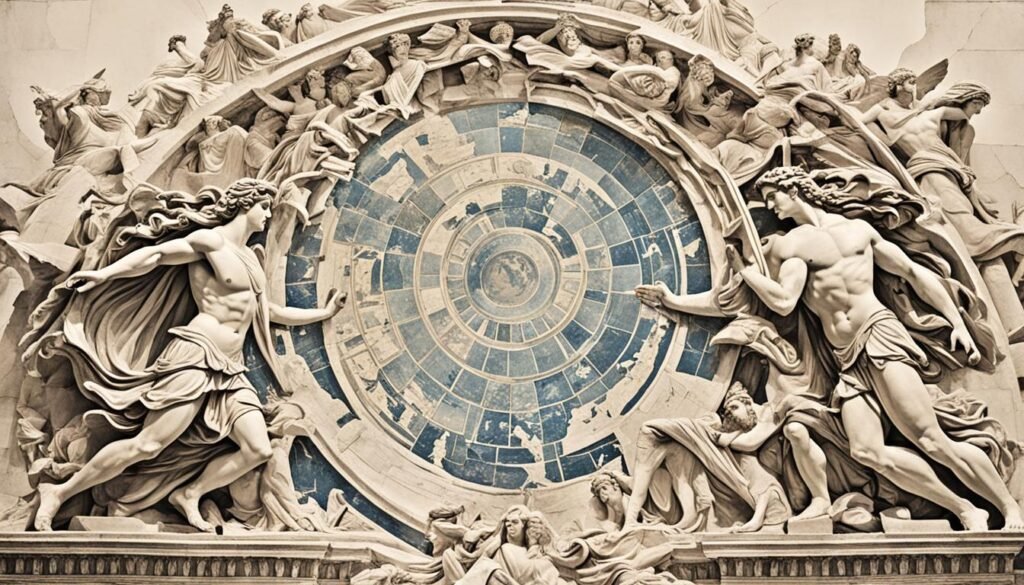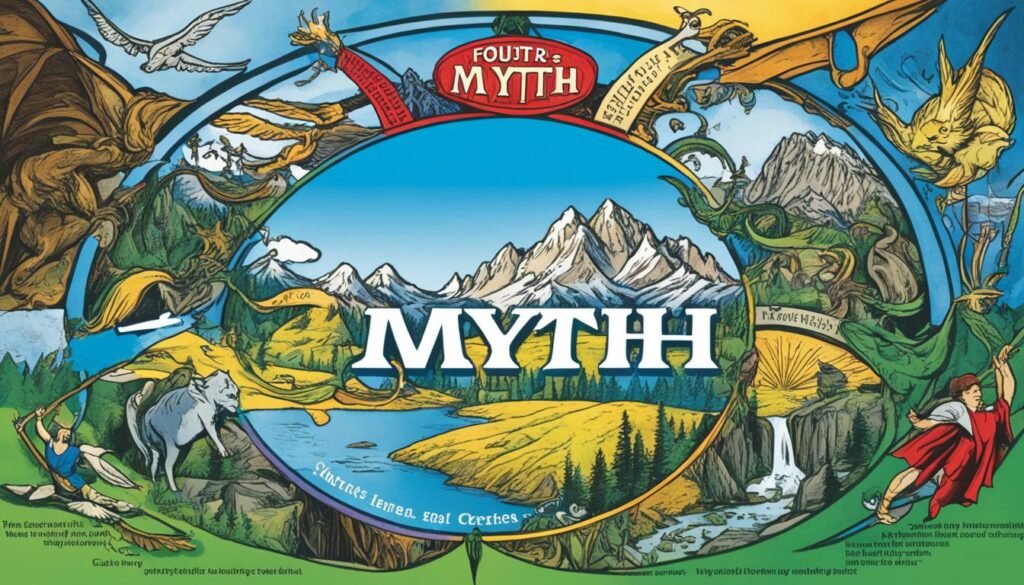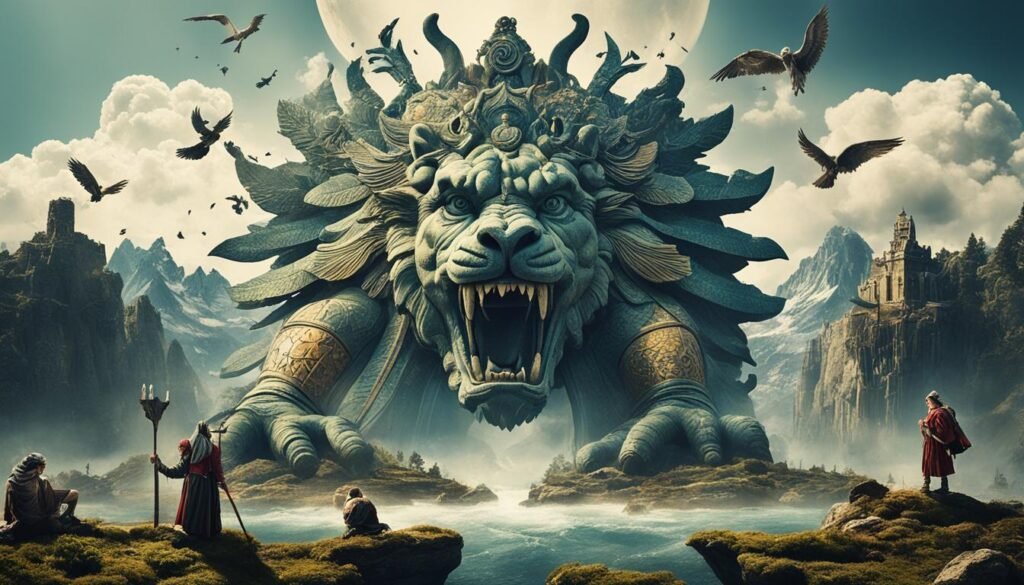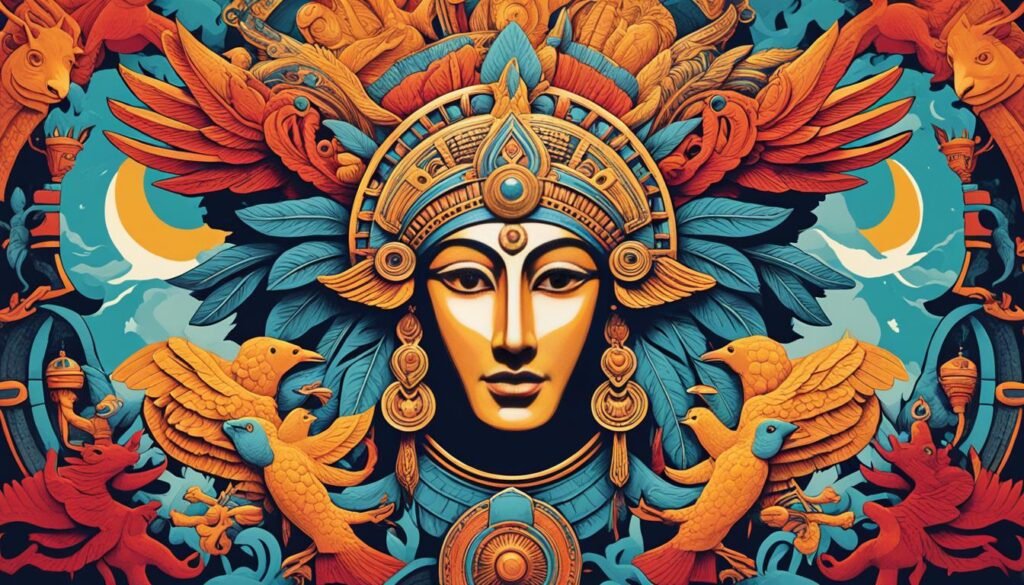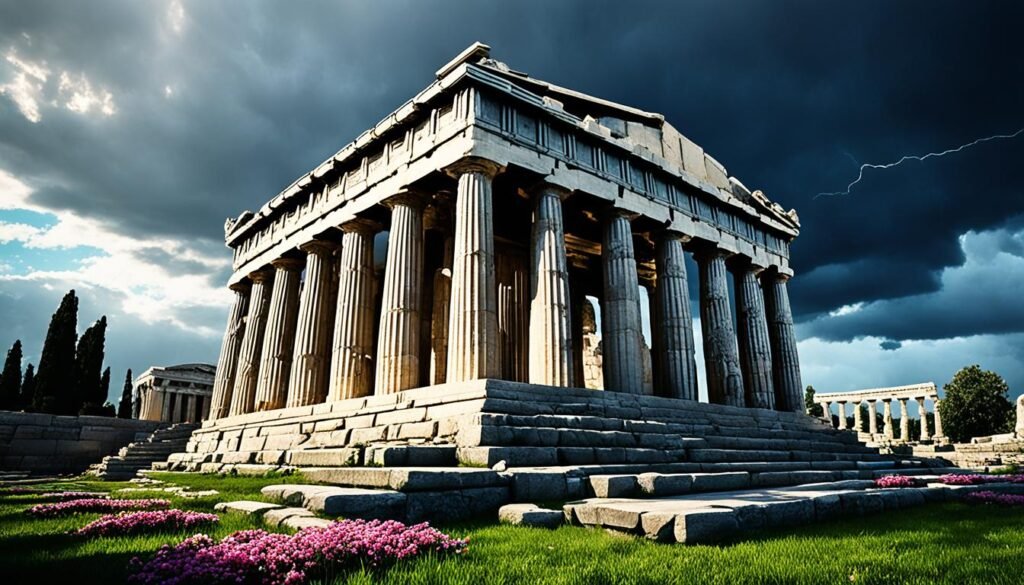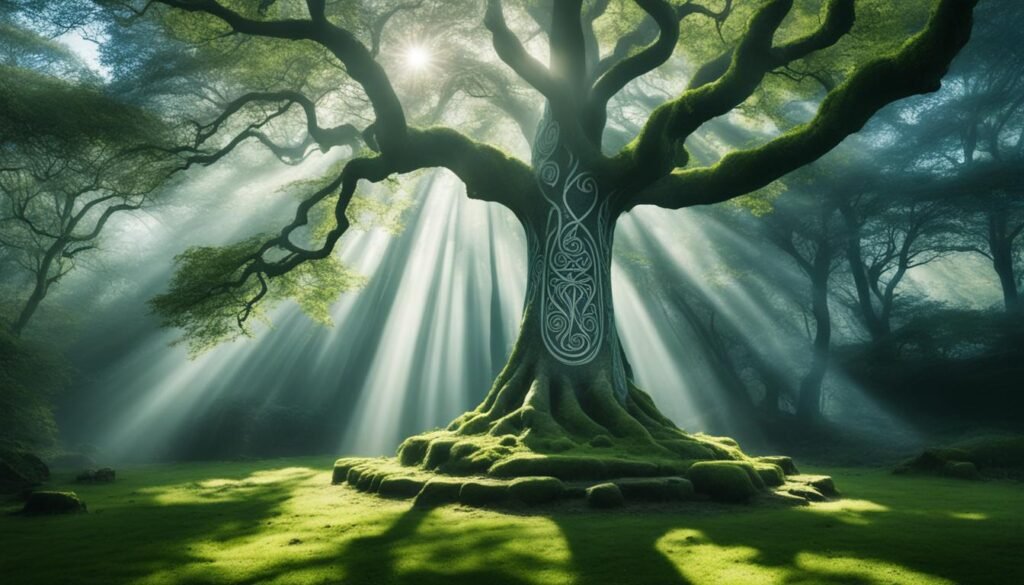Myths have been with us as long as stories have been told. They go way back to when humans began putting ideas into writing. These ancient myths tell us how the world began, who we are as people, and our place in the universe. They’re not quite the same as religion, but myths are deeply connected with it. Our very first stories were about the Gods and the mysteries of life.
Human life has always been intertwined with myths. They have been key in understanding the world’s big questions. Despite being old, myths still shape our culture and thoughts today. Think of the classic tale where good and evil clash or the hero who journeys to find themselves. Such stories show the ongoing power of myths and how they guide our understanding.
One of the oldest signs of myths is in early cave paintings. Back then, people wanted to make sense of the world. They painted to share their stories and ponder the universe. These are the roots of our storytelling tradition, which still flourishes in many forms, from written tales to blockbuster films.
Key Takeaways : Myths
- Myths and mythologies have been an integral part of human culture since the dawn of civilization.
- Mythological stories attempt to explain the creation of the world, the origin of humanity, and the role of death.
- Myths are not religions, but they are an essential component of religious belief systems.
- The art of storytelling and the power of myths have influenced various aspects of human society, including art, literature, and film.
- Ancient cave paintings are believed to be the earliest records of mythology, created by early humans to understand the world around them.
The Enduring Power of Myths

Myths take us to new worlds, sparking our imagination and senses. They can encourage, motivate, educate, and heal. This makes us better understand the world and connect with others.
Myths as Timeless Tales
Myths are stories that have shaped the world. They provide deep meaning and messages that touch every generation. As mythological stories, they connect us through their wisdom across time and place.
Cultural Significance of Mythology
Each era sees myths reshaped to speak to their time. This shows the continuing relevance of myth in our lives. They enlighten us about shared human experiences, lasting beyond time and borders.
Joseph Campbell’s Impact on Myth Studies
Joseph Campbell highlighted myths’ key roles: they awe us, explain the world, affirm our norms, and teach us. His work sheds light on the profound functions myths serve in society and personal growth.
Ancient Origins of Storytelling
Early cave paintings are our first glimpse into mythology. They were like stories, drawn by ancient people. These tales aimed to make sense of life, the Earth, animals, and our place in the world. Before we could write, humans told these stories through acts and dance. Mythology has been a key part of human culture for ages, long before writing existed.
Cave Paintings and Early Narratives
The oldest stories were told through cave paintings. These pictures shared what early humans believed. They also showed their interactions with gods, goddesses, and mythological creatures. Back then, people told these stories by speaking, dancing, and using ceremonies. This kept the tales alive, passing them down through time.
Mythology and the Birth of Language
When language started, sharing stories became easier. These timeless tales from different cultures shaped the beliefs of people everywhere. As people spoke more, the variety of myths and legends grew. Incredible stories like the ancient Greek myths and the Norse sagas became part of our shared history. They show what it means to be human and what we dream of.
The Four Functions of Myth
Joseph Campbell, an American scholar, discovered myths have four key roles. These are metaphysical, cosmological, sociological, and pedagogical. These functions deeply influenced human culture. They continue to inspire us today.
Metaphysical: Awakening Awe and Wonder
Myths awaken awe and wonder about existence. They remind us life is a miracle. Myths take us beyond the ordinary, encouraging us to think about the universe and origin of the world. They use stories of gods and natural phenomena to satisfy our deep need for answers about life’s meaning and our place in the cosmos.
Cosmological: Explaining the Universe
Cosmological myths explain how the world began. These stories use deities and supernatural beings as symbols. They tackle questions about the universe and humanity’s start. Myths help us understand the cosmos through personified natural world phenomena.
Sociological: Validating Social Order
On a societal level, myths back cultural norms and traditions. They help create a shared understanding within a group. Myths show a society’s values through social structures. They influence how we see ourselves and others.
Pedagogical: Guiding Life’s Journey
Myths guide us through life stages. They offer rites of passage and ways to deal with life’s problems. These stories provide life lessons and show human life’s big themes.
Myths are more than stories. They are important traditional tales that have deeply impacted us. They continue to be relevant across generations, touching on universal themes of human experience.
myths and Their Universal Themes
Myths from around the world share key themes and questions. They reflect what all humans think about and experience. Stories often explore the mysteries of
Birth, Death, and the Afterlife , the Origin of Man and the World, and the fight between Good versus Evil
. Myths bring these abstract ideas to life through the stories of gods, heroes, and spirits.
Take Greek myths about powerful gods, or the Norse tales of Ragnarok. Also, the creation stories from many native cultures. Each tells stories that speak to our shared human wisdom. Myths help us understand deep parts of being human.
Myths cover everything from birth, death, to world creation, and the battle of good versus evil. They all explore the core of human life. With their stories of gods and heroes, myths offer a way to look at life’s big questions.
World myths use gods and heroes to tell us about life, death, and the universe. Greek myths, Norse tales like Ragnarok, and the stories of other people share these themes. They speak to us across time and culture with their shared wisdom.
The Continuing Relevance of Myths
Myths still influence today’s art, books, movies, and advertising. In them, creators give new life to old stories. By using mythological figures and archetypes, companies and artists connect with people through a cultural language everyone understands.
Myths in Art and Advertising
Think about Jacqueline Kennedy linking her husband’s reign to King Arthur’s Camelot. Or how Greek government ads adopt the “Golden Fleece” story. These uses remind us of mythic elements‘ lasting impact. They show how myths and legends get updated to fit different times, grabbing our attention anew.
Reinterpreting Myths for Each Generation
The ongoing influence of myth is its universal insight, crossing ages and cultures. People are drawn to stories that mirror our myths and legends about being human. So, artists, writers, and marketers find ideas in these ancient narratives and spin them to suit today’s audience.
The Hero’s Journey
One of the oldest and most powerful stories, the “hero’s journey,” was first talked about by Joseph Campbell in his book “The Hero with a Thousand Faces.” This story pattern, known as a monomyth, shows the steps heroes take in myths. They start with a quest, face hard things, and end up changed. Think about famous heroes from stories like Odysseus to Luke Skywalker. Their journeys have kept people spellbound for ages. They help us understand how we grow, find ourselves, and look for the meaning of life.
The Monomyth and the Hero Archetype
Many authors, filmmakers, and artists use this hero’s quest theme. This helps them tell stories that feel important and timeless. It could be Prometheus’ epic journey, Theseus’ legendary trips, or Katniss Everdeen’s modern bravery. The hero’s journey talks about struggles we all face: problems, fights, and how we change because of them.
The Hero’s Quest in Literature and Film
From ancient Greek myths to today’s science fiction and fantasy, the hero’s journey grabs people’s attention. It’s woven into tales loved around the world. The monomyth is deep and connects with our dreams and fears. It lets storytellers dig into what makes us human and brings to light our common battles.
Greek and Roman Mythology
The myths from ancient Greece and Rome are huge in our culture and writing. They include the Olympian gods and goddesses like Zeus, Athena, Poseidon, and Prometheus. These gods show all kinds of human traits and tell great stories. They talk about how the world began, heroic adventures, and the fight between good and evil.
The Olympian Gods and Goddesses
The Olympian gods and goddesses were a cool mix of beings from Greek and Roman tales. Each had their own special story and power. For example, there’s Zeus, the king of the gods, or Athena, the goddess of wisdom and courage. Their stories and powers have shaped our art, stories, and thoughts for ages.
Legendary Heroes and Epic Adventures
Then, there’s the legendary heroes like Odysseus, Theseus, and Hercules. Their stories are filled with amazing deeds and big adventures. They’ve been on quests, faced huge problems, and changed a lot through it all. These tales still inspire today’s writers and readers. They help us understand big ideas and stories.
Norse and Celtic Mythology
Ancient Greece and Rome aren’t the only ones with rich stories. Norse and Celtic tales have also deeply influenced our world. These myths full of gods, legends, and magic still capture our hearts today.
The Norse Pantheon and Ragnarök
The gods like Odin, Thor, and Loki from Norse myths are well-known. Tales like Ragnarök, where the world faces destruction and rebirth, have inspired many. From J.R.R. Tolkien’s works to today’s fantasies, Norse stories are rich with meaning.
Celtic Deities and Folklore
The Celtic world features deities such as Dagda and Cernunnos. They show a deep love and respect for the natural world. Their stories have flourished internationally, seen in legends like King Arthur and still in Irish and Scottish folklore.
Myths and Legends from Around the World
Myths and legends from ancient Greece, Rome, and Northern Europe are well known. But, the world is full of other rich traditions, too. From North America’s native stories to Africa and Oceania’s myths, each has its own unique view. These stories show the diverse beliefs that have influenced human history.
Native American Mythology
North America’s cultures have a rich history of mythology. Each tribe has its own gods, spirits, and heroes. For example, the Lakota tell about the coyote, a trickster, and the Iroquois honor the Great Peacemaker. These stories often include natural elements, showing respect for the land and its creatures.
African and Oceanic Myths
African and Oceanic myths vary widely, reflecting different cultures. West Africa’s Yoruba worship the Orisha deities. And the Igbo have Chukwu, the sky god. Meanwhile, the Pacific islands share tales of heroes and spirits Who shaped their world.
Asian Mythologies
Asia’s myths are just as varied, from Hindu epics to East Asian folktales. The Mahabharata and Ramayana are well-known Indian stories. They tell of heroes and great battles. Chinese and Japanese myths often have dragons and other magical beings. These stories teach about the balance between humans and nature.
Also Read : Debunking Myths about Technology and Gadgets
Cambridge University Press provides teaching resources on ancient Greek myths, including the legendary stories of Poseidon, Theseus, and Demeter. These traditional stories, often distinguished from classical mythology, reflect the meaning of myth as a means to explain natural phenomena and extraordinary events in early history.
From the Trojan War to the legend of Atlantis, these myths, rooted in classical Greek and Roman mythology, have been used to explain the origins of the world and the religious meanings behind inanimate and superhuman beings. The English dictionary offers definitions of myth and its usage, while academic sources like the Encycloædia Britannica delve into the eschatological and religious significance of these myths, as seen in Platonism and the writings of Proclus.
Whether exploring Norse mythology or the stories of the Olympians and Titans, myths continue to captivate readers across the world, from Kindle devices to paperback editions, with numerous customer reviews praising their timeless appeal as bedtime stories or sources of wisdom and courage.
FAQs
Q: How does greek mythology influence modern storytelling?
A: Greek mythology serves as a foundation for many stories, films, and cultural references in everyday life, shaping narratives and character archetypes that continue to resonate with audiences.
Q: What are some famous ancient greek myths that have had a lasting impact?
A: Stories such as the tale of the Trojan War, the adventures of the Argonauts, and the myths surrounding the Olympian gods have been influential and continue to be referenced in various forms of media.
Q: How do myths differ from modern fables?
A: Myths are traditional stories that often explain natural phenomena or cultural beliefs, while fables are short narratives with moral lessons typically involving animals or inanimate objects.
Q: Can you provide examples of well-known figures from ancient greek mythology?
A: Characters like Zeus, Athena, Apollo, and Medusa are iconic figures from ancient Greek myths, each with their own unique traits and stories.
Q: How does the study of myth differ from the study of classical mythology?
A: The study of myth encompasses a broader examination of traditional stories and their cultural significance, while classical mythology focuses specifically on the myths of ancient Greece and Rome.
Q: How have the themes of ancient greek myths been reinterpreted in modern times?
A: Contemporary interpretations of ancient Greek myths often explore timeless themes such as love, power, destiny, and the eternal struggle between gods and mortals.
Q: What role do customer reviews play in shaping the perception of myth-related products?
A: Customer reviews can provide valuable insights into the quality and authenticity of myth-related products such as books, films, and merchandise, influencing purchasing decisions and shaping public opinion.
Source Links
- https://dreamlightfugitive.wordpress.com/2015/07/02/the-power-of-storytelling-and-mythology/
- https://medium.com/illumination/the-importance-of-mythology-9b922983d150
- https://www.pbs.org/mythsandheroes/myths_what.html
